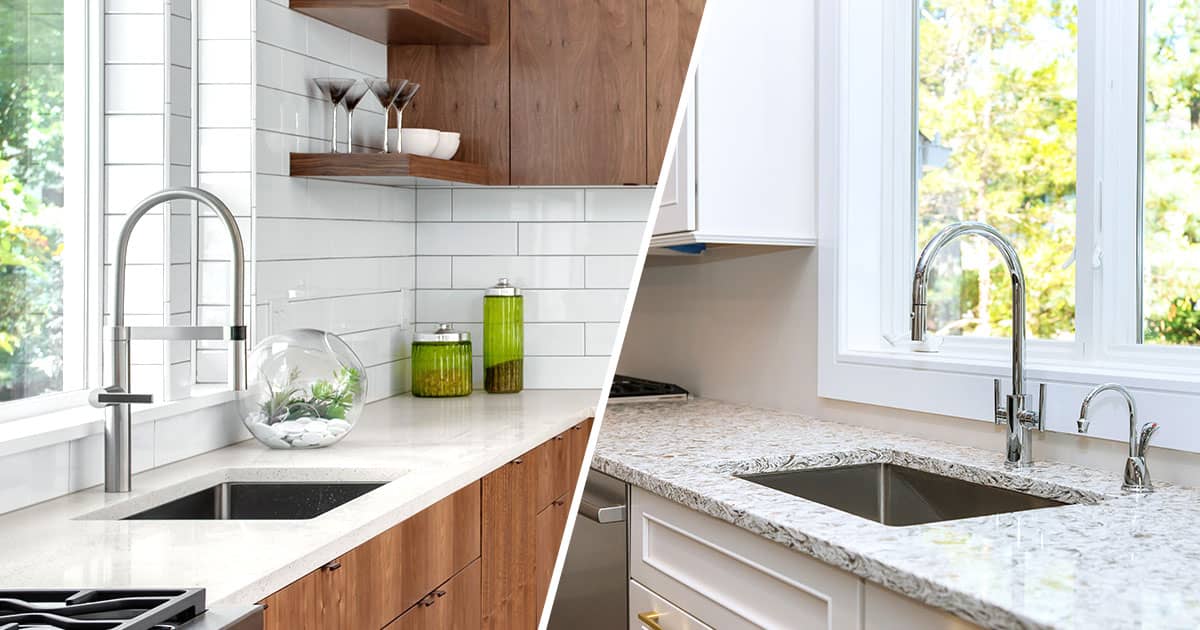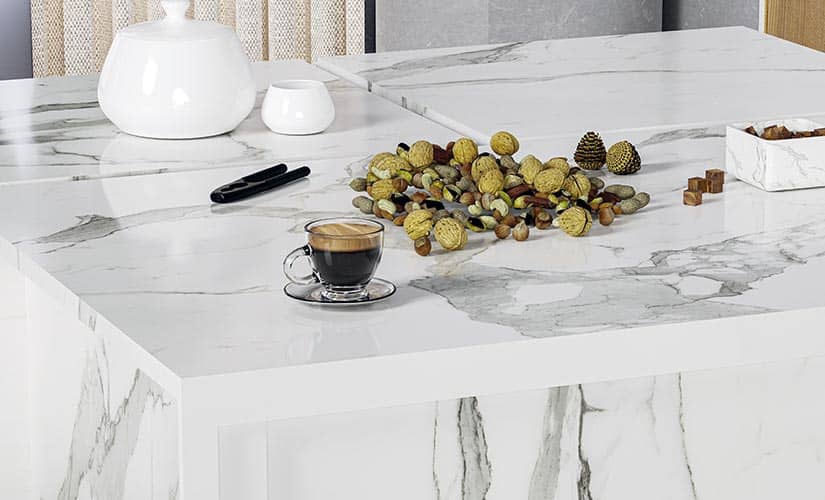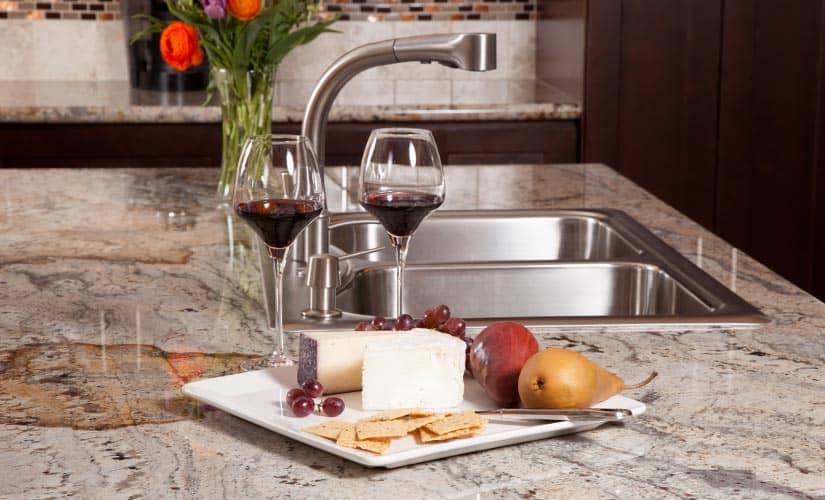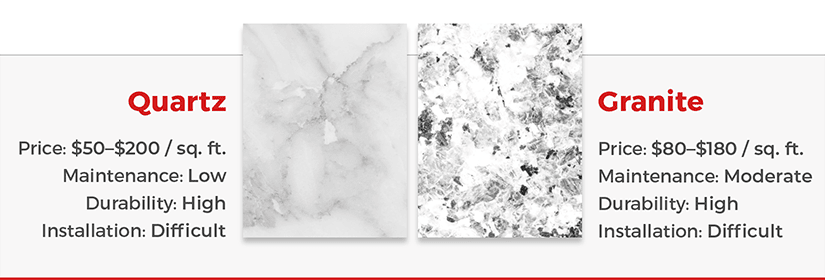Quartz vs. Granite Countertops: Which Is Best for Your Kitchen?

Narrowing down your ideal kitchen or bathroom countertop material isn't always easy. You want something that'll hold up against regular wear and tear while complementing your dream design. If you've got an eye for modern, luxury style, the choice often comes down to quartz vs. granite countertops.
Both granite and quartz countertops are considered durable, high-end stones, but is one really better than the other? From appearance and price to environmental impact, we created a guide to weigh the pros and cons of each popular surface material to help with your decision paralysis.
Table of Contents
Quartz vs Granite: What's the Difference?
Before we dive into the details, here are some of the most obvious differences and commonalities between quartz and granite countertops.
| Quartz | Granite | |
|---|---|---|
| Composition | Engineered stone made out of quartz and resin compounds | Naturally occurring stone quarried from the earth |
| Appearance | Limitless customized color and pattern options available | Only available in naturally occurring mineral patterns and colors |
| Durability | Incredibly durable | Slightly less durable |
| Stain Resistance | More stain-resistant | Less stain-resistant, but speckled pattern will hide stains |
| Heat Resistance | Less heat-resistant | More heat-resistant |
| Maintenance | Low-maintenance | Low-maintenance, but annual resealing required |
| Price | $50-$200 per installed square foot | $80-$180 per installed square foot |
| Sustainability | Higher carbon footprint due to processing and transportation | Lower carbon footprint, but still needs to be quarried and transported |
What Is Quartz?

While quartz does occur naturally, quartz slabs are engineered from stone byproducts that are ground up and fabricated into countertops. These slabs are typically composed of 90% to 95% natural quartz, with the remaining 5% to 10% made of resin binders, pigments, glass shards, and other synthetic materials. The result is a hard - but not brittle - nonporous surface material perfect for those looking for max style with minimal maintenance.
Because quartz is a manufactured product, there's a wide variety of colors and patterns to choose from. You can find slabs displaying dramatic veining to replicate expensive marble countertops, vibrant colors like orange or turquoise, or even suspended mirror shards for a design that truly shines -the possibilities are endless.
Pros:
 Limitless color and design options
Limitless color and design options Versatile
Versatile Low-maintenance
Low-maintenance Durable
Durable Can increase home value
Can increase home value
Cons:
 Expensive
Expensive Vulnerable to heat damage
Vulnerable to heat damage Difficult to install
Difficult to install Not a true natural stone
Not a true natural stone
What Is Granite?

Like quartz, granite is one of the most popular choices for today's kitchen countertops. Known for its durability and trademark speckled composition, granite is a true natural stone that's found in a wide range of colors and patterns to suit most interior design styles. The color and freckling depend on the mineral makeup of the particular stone, but you can find granite slabs in shades of gold, forest green, black and white, and even clay red.
Both granite and quartz share coveted nonporous properties that make them some of the easiest countertop materials to care for. However, granite is more heat-resistant than quartz, so hot pads are nearly obsolete.
Pros:
 Wide variety of styles
Wide variety of styles Sustainable
Sustainable Heat-resistant
Heat-resistant Durable
Durable Low-maintenance
Low-maintenance
Cons:
 Must be resealed annually
Must be resealed annually Prone to cracks and chips
Prone to cracks and chips May require extra support in areas with large overhangs
May require extra support in areas with large overhangs
Physical Qualities

Quartz countertops are ideal if you want to achieve a warm contemporary look in your kitchen. There's a wide range of colors and patterns available, especially in popular neutral colors like white, black, and gray.
Quartz resembles natural stone like marble and can even replicate granite freckling, but because it's man-made, the patterns and hues you can find are much more uniform. You'll also notice that quartz countertops have very tight seams, which create the illusion of a seamless slab.
Granite, on the other hand, is a natural stone, so you're limited to naturally occurring mineral compositions when picking your countertops. That means every granite countertop will be a unique piece since no two slabs are the same. The one-of-a-kind appearance makes this natural stone a beautiful statement piece in any style of kitchen.
Granite is available in whole slabs or as tiles that are cut and polished. Seams between the cuts are more obvious than they are in quartz countertops and tiles will emphasize the disruptions in the patterns more. If you decide to go with granite, we recommend you pick your granite countertop directly from a warehouse or design center and not from a sample, since what you'll see in the sample won't match the slab that ends up in your kitchen.
Durability
Both quartz and granite countertops are known for their strength and durability - however, there are a few key differences to consider.
Quartz is a nonporous, engineered material, making it virtually life-proof. The manufactured stone is solid, antibacterial, and can resist cracks, chips, and stains. That said, quartz countertops are not completely heatproof, so take caution when setting hot pots and pans directly on the counter.
Granite has the lowest porosity and permeability of all natural stone materials, but it's not as durable as quartz. Annual resealing is required to protect it from stains and scratches. Minor scratches or cracks can be filled with a color-matching resin or epoxy. If you find a larger crack, hire a professional to fix it.
Excessive heat is the only thing that can damage both granite and quartz countertops, although granite countertops can withstand higher temperatures.
Installation
It's advised to hire a professional installer for both granite and quartz countertops since they're very heavy materials. If you're planning to DIY your kitchen remodel, keep in mind that even a smaller 36-inch countertop can weigh almost 100 pounds - so don't attempt to lift it by yourself.
If you're installing granite countertops, remember to seal them right after installation to prepare them for the wear and tear they're about to experience.
Maintenance
You'll see more distinct differences when it comes to maintaining quartz vs. granite countertops.
Because quartz is nonporous, it never has to be sealed, which is a big selling point for homeowners who prioritize low-maintenance products. A quick wipe with soap and water is all that's required to keep quartz countertops sanitized and looking their best.
Granite, on the other hand, is a natural stone, so it'll need to be resealed annually to resist bacteria and stains. However, on a day-to-day basis, the natural pattern will disguise marks and stains better than quartz. Like quartz, regular cleaning with soap and water between sealings will keep your granite countertops in pristine condition.
Environmental Impact
Neither material is considered environmentally unfriendly as they don't emit significant amounts of volatile organic compounds (VOCs) into the atmosphere. Concerns that the radiation from granite countertops could increase the overall annual radiation above normal levels have been debunked.
While granite has to be quarried out of the earth, the carbon footprint of this material is still lower than that of quartz, which needs to be processed to be suitable as a countertop.
Price
Quartz and granite countertops are both high-end selections for your kitchen countertops and can make up a large portion of your remodel budget. However, quartz is slightly less expensive than granite - although the most expensive quartz may cost more than the highest-quality granite. The average price of quartz countertops ranges from $50-$200 per square foot, while granite costs from $80-$180 per square foot.
The price levels are not only reflected in the quality of the material but also the color, pattern, and treatment of the stones. Quartz countertops can get more expensive when they're modeled after natural granite or marble, some of the most beautiful naturally occurring stones.
Highly requested mineral patterns or colors will have less availability and will be more expensive. You'll likely get a better price when you purchase your granite slab directly from the wholesaler.
Have more kitchen design questions? Our NKBA-certified designers will help you create the perfect kitchen for free! Fill out our 3D kitchen design form for expert guidance on your dream kitchen.
Quartz vs. Granite Countertops FAQs
Still weighing the granite vs. quartz countertops pros and cons? We answered a few of the most frequently asked questions to help you make your decision.
Which is better: quartz or granite?
The choice between quartz or granite ultimately comes down to personal preference, but in terms of maintenance and durability, quartz may be slightly better than granite. Because quartz is a hard, nonporous material, it's easier to maintain and is much less susceptible to stains and scratches than granite. However, granite wins out in terms of heat resistance - the resins found in quartz make it more vulnerable to heat damage.
Are quartz countertops more popular than granite?
While both are classic countertop materials, quartz has lapsed granite in popularity in recent years due to its ability to replicate more expensive natural stones while boasting unparalleled durability. Plus, quartz countertops require less maintenance than most other surface materials.
Are quartz countertops a good investment?
Both quartz and granite countertops are good investments that can increase the value of your home. However, if you plan on staying in your home for a long time, quartz countertops may be a better choice financially, even with the high initial price tag. Because these countertops are virtually indestructible and don't require sealing, you won't need to spend extra money on maintenance and repairs for years to come.
If you're planning a kitchen countertop refresh, consider updated, quality cabinets to match. Browse our wide selection of ready-to-assemble and pre-assembled cabinets to find the perfect color and style to bring your dream design to life.

























